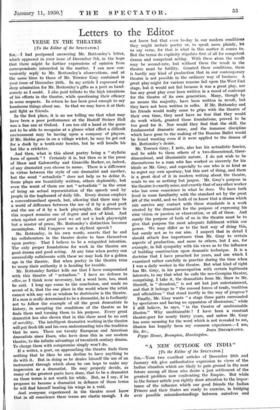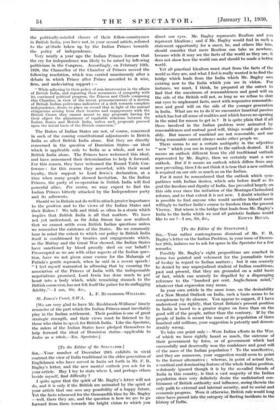"A NEW OUTLOOK ON INDIA"
[To the Editor of the SPECTATOR.]
&FL—Your two excellent articles of December 28th and January 4th give authoritative expression to views of the Indian situation which are likely to gain ground in the near future among all those who desire a just settlement of the greatest ,problem now confronting the Empire. But while in the former article you rightly draw attention to the impor- tance of the influence which our good friends the Indian princes and their States are ,ready to exercise, in bridging over possible Misunderstandings between ourselves and
the politically-minded classes of their fellow-countrymen in British India, you have not, in your second article, referred to the attitude taken up by the Indian Princes towards the policy of independence.
Very nearly a year ago the Indian Princes foresaw that the cry for independence was likely to be raised by left-wing politicians in the Congress. Accordingly, on February 13th, 1929, the Chancellor of the Chamber of Princes moved the following resolution, which was carried unanimously after a debate in which Prince after Prince accorded to it wise, firm, and undeviating support :—
" While adhering to their policy of non-intervention in the affairs of British India, and repeating their assurances of sympathy with its continued political progress, the Princes and Chiefs composing this Chamber, in view of the recent pronouncements of a section of British Indian politicians indicative of a drift towards complete independence, desire to place on record that in light of the mutual obligations arising from their treaties and engagements with the British Crown they cannot assent to any proposals having for their object the adjustment of equitable relations between the Indian States and British India, unless such proposals proceed upon the initial basis of the British connexion."
The Rulers of Indian States are not, of course, concerned in such of the coming constitutional adjustments in British India as affect British India alone. But they are directly concerned in the question of Dominion Status—an ideal which is applicable only to India as a whole, and not to British India alone. The Princes have welcomed this ideal, and have announced their determination to help it forward. For this reason, they have welcomed the Round Table Con- ference : for this reason they accorded, with their usual loyalty, their support to Lord Irwin's declaration, at a time when many people showed hesitation. In the Indian Princes, the party of co-operation in British India will find powerful allies. Per contra, we may expect to find the Indian Princes bitterly attacked by the Independence party and its adherents.
Should we in Britain not do well to attach greater importance to the position and to the views of the Indian States and their Rulers ? We talk and think so often in a strain which implies that British India is all that matters. We have not yet understood, as Sir John Simon has now realized, that we cannot settle even British Indian questions unless we remember the existence of the States. Do we commonly bear in mind the extent to which our policy in British India itself is conditioned by treaties and engagements which, as the Mutiny and the Great War showed, the Indian States have sanctioned by blood proudly shed on our behalf ? Preoccupied as we are with other aspects of the Indian ques- tion, have we not given some excuse for the Maharaja of Patiala's gentle reproach, when he said in a recent speech : " I feel myself warranted in affirming that by ensuring the association of the Princes of India with the indispensable negotiations promised, Lord Irwin has done much to put heart into a body which, while remaining staunch to the British connexion, has not felt itself the gainer for its unflagging fidelity."—I am, Sir, &c., St. James's Court, S.W.1. L. F. RUSUBROOK-WILLIAMS.
[We are very glad to have Mr. Rushbrook-Williams' timely reminder of the part which the Indian Princes must inevitably play in the Indian settlement. Their position is one of great strategic strength, and their views must be listened to by those who claim to speak for British India. Like the Spectator, the rulers of the Indian States have pledged themselves to help forward the ideal of Dominion status—applicable to India as a whole.—ED. Spectator.]







































 Previous page
Previous page